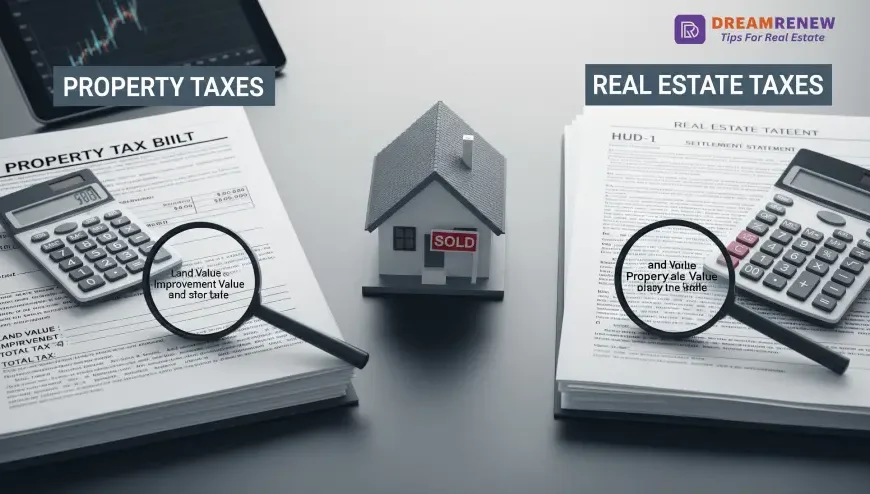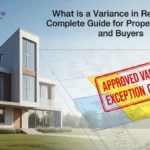Hey! Ever wondered if “real estate tax” and “property tax” are the same thing? You’re not alone. Many people get confused about this. Today, we’ll break it down in simple words so even an 8th grader can explain it by the end. Ready? Let’s go!
What Is Property Tax?
Property tax is a payment you make to your city or town because you own a house or land. This money is used to pay for things like schools, roads, parks, and fire stations. If you own a home, you pay property tax every year.
What Is Real Estate Tax?
Real estate tax is just another way of saying property tax. It’s a tax on things that can’t be moved, like land and buildings. So, when people say “real estate tax,” they mean the tax you pay for owning land or a house.
Are Property Tax and Real Estate Tax the Same Thing?
Here’s the simple answer: Yes, they are the same thing for most people.
Both terms are used to talk about taxes you pay for owning a home or land. Some places prefer to say “property tax,” others say “real estate tax,” but they’re talking about the same payment.
Why People Get Confused About These Terms
People get mixed up because of the words. “Property” can mean anything you own, like a car or a couch. But when the government says “property tax,” they are talking about real property—land and buildings.
In some places, “property tax” also means taxes on things like cars or boats, which is called personal property tax.
What Property Taxes Are Used For
Your property tax money helps pay for:
- Public schools 🏫
- Fixing roads and sidewalks 🚧
- Police and fire stations 🚒🚓
- Parks and libraries 🌳📚
So, when you pay your taxes, you’re helping your whole community.
What Things Are Taxed?
Mainly, property tax applies to:
- Houses 🏠
- Apartments (if you own them)
- Land (even if it’s empty)
- Commercial buildings (like stores or offices)
In some places, you also pay taxes on:
- Cars 🚗
- Boats 🚤
- Business equipment 🖥️
How Do Property Taxes Get Calculated?
Here’s how it works:
- The local government looks at how much your house and land are worth.
- They multiply that by a tax rate (this rate changes by city or town).
- The result is your property tax bill.
Example: If your home is worth $100,000 and the tax rate is 2%, you’ll pay $2,000 in property tax that year.
Who Pays Property Taxes?
If you own a home or land, you pay property taxes.
If you rent, you don’t pay property tax directly, but your landlord includes that cost in your rent.
What is Personal Property Tax?
Personal property tax is a tax on things that can move. This includes:
- Cars
- Motorcycles
- Boats
- Business machines
Not every state in the U.S. has a personal property tax, but some do.
Common Myths About Property Taxes
Let’s clear up some common misunderstandings:
- Myth: Property taxes only apply to houses.
Truth: They also apply to land and other real estate. - Myth: Once you buy a house, you’re done paying taxes on it.
Truth: Property taxes are ongoing. You pay them every year. - Myth: Renters don’t pay property taxes.
Truth: Renters don’t pay directly, but landlords often raise rent to cover these taxes.
Can You Lower Your Property Taxes?
Yes! You can sometimes reduce your tax bill by:
- Applying for a homestead exemption (if it’s your main home)
- Challenging a high property assessment
- Checking if you qualify for tax breaks (for seniors, veterans, etc.)
Property Taxes and Buying a Home
Before buying a house, always check how much the property taxes are. High taxes can make a home more expensive to own, even if the house price is low.
How to Be Ready for Property Tax Bills
Here’s how smart homeowners stay ready:
- Set aside money every month for taxes.
- If you have a mortgage, your bank may include taxes in your monthly payment.
- Watch out for changes in your home’s value; taxes can go up if your property is re-assessed.
Final Thoughts
So, back to the main question: Are real estate taxes the same as property taxes?
Yes, for homeowners, they mean the same thing. Both are taxes you pay because you own land or a home. The terms sound different but are used for the same purpose.
Knowing how property taxes work helps you avoid surprises and manage your money better.
FAQs About Property Taxes
Do property taxes change every year?
They can. If the value of your home changes or your city changes its tax rate, your bill can go up or down.
What happens if I don’t pay my property taxes?
You could get fined, have a lien placed on your property, or even lose your home if taxes stay unpaid for too long.
Do I pay property taxes when I sell my house?
Yes, but only for the time you owned the home that year. The buyer pays the rest.
Can my taxes go up even if my home’s value drops?
Yes. If your city raises tax rates, your taxes can still go up, even if your home is worth less.
Where to find real estate taxes paid
You can find how much real estate (property) taxes you paid in a few places:
- Property Tax Bill – Check the tax bill or receipt you get from your local tax office.
- Mortgage Lender’s Year-End Statement – If you pay taxes through your mortgage escrow, your lender will send you a statement showing the total amount paid.
- Form 1098 (Mortgage Interest Statement) – Box 10 on Form 1098 shows real estate taxes paid if your lender paid them from escrow.
- County or City Tax Website – Many local governments allow you to look up your tax payment history online.
Are real estate taxes the same as property taxes on 1098?
Yes, real estate taxes on Form 1098 are the same as property taxes.
The IRS uses the term “real estate taxes”, but most people call them “property taxes.”
On Form 1098 (Mortgage Interest Statement), the amount in Box 10 shows the property taxes your lender paid on your behalf from your escrow account.
However, Form 1098 only shows what the lender paid. If you paid any property taxes directly (not through escrow), those amounts won’t be listed on the 1098 you need to keep separate records for those payments.




